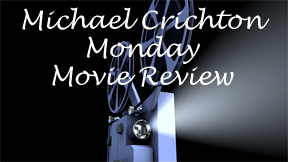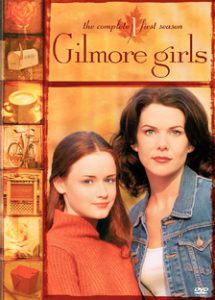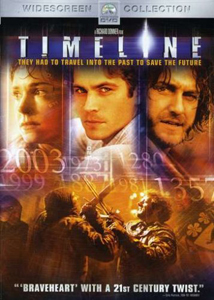Two late-20th century icons’ paths cross in “Timeline” (2003), director Richard Donner’s film based on Michael Crichton’s 1999 novel. The screenplay is faithful enough to the narrative, but not at all to the tone. It’s by design, as this is a tame PG-13 adaptation of one of Crichton’s most grim and violent adventures.
Donner the action director
Donner (“Superman,” “Lethal Weapon”), in his penultimate film (he died earlier this month), does effective logistical work. He captures incredible (and no doubt incredibly expensive) settings like a fully constructed castle, plus images like volleys of fiery French and English arrows passing each other in the night sky.
Character arcs are a different matter. While it’s true that “Timeline” is one of Crichton’s weaker character novels, the group of anthropologists that time-travels from 2003 to the 100 Years War of 1353 borders on goofiness.

“Timeline” (2003)
Director: Richard Donner
Writers: Jeff Maguire, George Nolfi (screenplay); Michael Crichton (novel)
Stars: Paul Walker, Gerard Butler, Frances O’Connor
Writers Jeff Maguire and Greg Nolfi add in a father-son relationship and a romance. It’s guffaw-worthy that surfer dude Paul Walker (as Chris) is the son of thickly Scottish-accented Billy Connolly (as the Professor). Especially when they could’ve made thickly Scottish-accented Gerard Butler (as Marek) into the son.
Misrepresenting history (and Crichton’s book)
Marek and Anna Friel’s 14th century Claire embark on a romance, which is fine in and of itself. Friel (“Pushing Daisies”) benefits from her French accent, and Butler brings admirable energy.
But it’s also an example of how “Timeline” discards Crichton’s lesson about medieval times. The novel’s message is that the past is so different from our own time that to venture there would mean nonstop confusion. And in the case of wartime, constant danger and fear.
The “Timeline” novel doesn’t explicitly say so, but it suggests there’s little time for cute little romances. Indeed, the book implies that openly moving about as a woman is dangerous; not so in the film.
Donner and his team deliver the very type of film that Crichton would hold up as a Hollywoodized take on medieval times: a rollicking swords-and-armor adventure where details aren’t all that important.
Granted, capturing history is hard, even if allowed to do so. Even “The 13th Warrior,” a better Crichton adaptation thanks to its R rating, loses the novel’s edge because it has everyone speaking modern English for the audience’s sake. Same thing here.
Almost too fast-paced to absorb
So perhaps it’s fairest to judge “Timeline” on its own merits. It’s a middle-of-the-road historical adventure: fast-paced and with some game performances. Frances O’Connor does yeoman’s work acting across from the miscast Walker; David Thewlis is on point as the self-interested corporate magnate; and Ethan Embry is a good guy to have back at home base, pleading his colleagues’ case.

The writers, even while cramming in Crichton’s details in shorthand (such as a frantic introduction of “transcription errors”), come up with some sharp original touches. I like how the villain gets sent back to medieval times simultaneous with our heroes coming home. It’s reminiscent of Ludlow meeting the baby T-rex at the end of the “Lost World” movie.
Overall, though, it’s hard to get a feel for “Timeline.” It doesn’t move too fast for a viewer to absorb the story (simplified from the novel’s chaos, naturally). But it does move too fast to absorb the time and place.
I doubt Donner was ashamed of “Timeline.” But it plays like he’s trying to pull a fast one: “Don’t look too closely at the thin characters and basic relationship dramas. Here’s another fiery cannonball crashing into a castle.”
Admittedly, those cannonballs are kinda cool.

